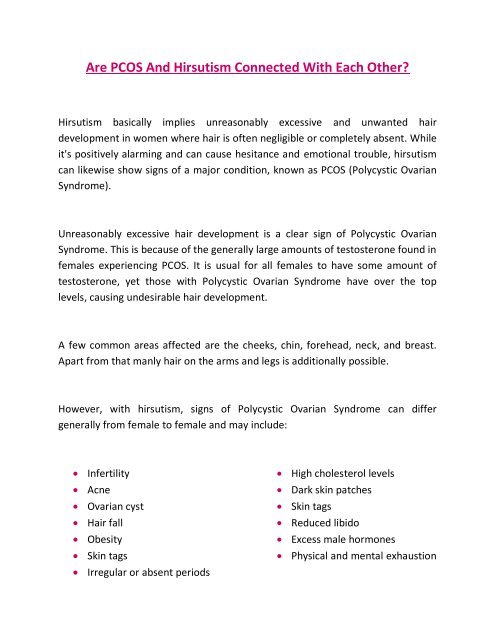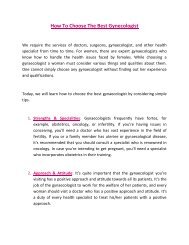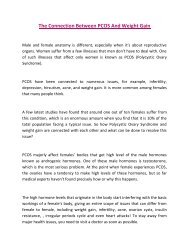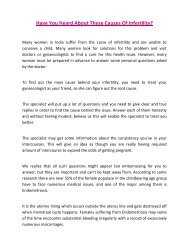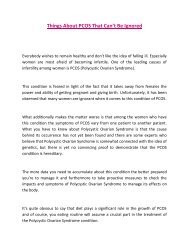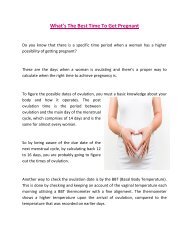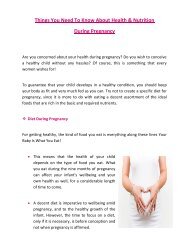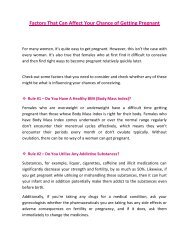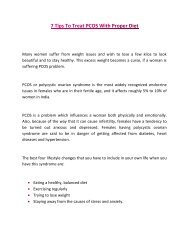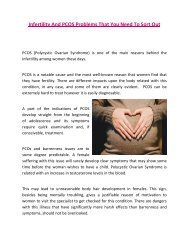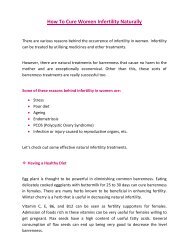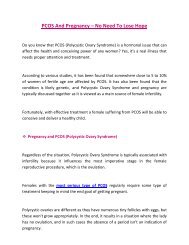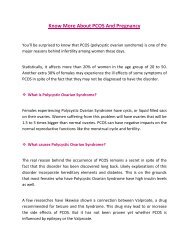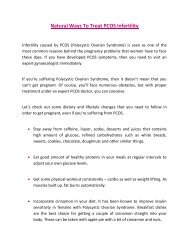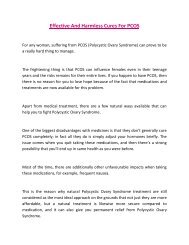Are PCOS And Hirsutism Connected With Each Other
You also want an ePaper? Increase the reach of your titles
YUMPU automatically turns print PDFs into web optimized ePapers that Google loves.
<strong>Are</strong> <strong>PCOS</strong> <strong>And</strong> <strong>Hirsutism</strong> <strong>Connected</strong> <strong>With</strong> <strong>Each</strong> <strong>Other</strong>?<br />
<strong>Hirsutism</strong> basically implies unreasonably excessive and unwanted hair<br />
development in women where hair is often negligible or completely absent. While<br />
it's positively alarming and can cause hesitance and emotional trouble, hirsutism<br />
can likewise show signs of a major condition, known as <strong>PCOS</strong> (Polycystic Ovarian<br />
Syndrome).<br />
Unreasonably excessive hair development is a clear sign of Polycystic Ovarian<br />
Syndrome. This is because of the generally large amounts of testosterone found in<br />
females experiencing <strong>PCOS</strong>. It is usual for all females to have some amount of<br />
testosterone, yet those with Polycystic Ovarian Syndrome have over the top<br />
levels, causing undesirable hair development.<br />
A few common areas affected are the cheeks, chin, forehead, neck, and breast.<br />
Apart from that manly hair on the arms and legs is additionally possible.<br />
However, with hirsutism, signs of Polycystic Ovarian Syndrome can differ<br />
generally from female to female and may include:<br />
Infertility<br />
Acne<br />
Ovarian cyst<br />
Hair fall<br />
Obesity<br />
Skin tags<br />
Irregular or absent periods<br />
High cholesterol levels<br />
Dark skin patches<br />
Skin tags<br />
Reduced libido<br />
Excess male hormones<br />
Physical and mental exhaustion
If you think that you’ve developed <strong>PCOS</strong> symptoms, then immediately visit the<br />
most renowned gynecologists in Mumbai to get the best treatment and advice.<br />
It’s quite obvious that excess hair in unwanted areas can prove to be really<br />
embarrassing and a cause of emotional stress for women. Although medical and<br />
cosmetic solutions such as bleaching, waxing, tweezing, laser hair expulsion and<br />
electrolysis give help from symptoms, they don't really treat the hidden reason<br />
for <strong>PCOS</strong> – a hormonal imbalance caused by insulin resistance.<br />
Insulin resistance is an imbalance of hormones, which is connected to the way the<br />
body manages insulin, at last influencing glucose levels and the way the body<br />
manages food and stores fat. Insulin resistant females normally suffer from excess<br />
weight in the stomach region, causing an ‘apple’ shape, instead of a ‘pear’ shape,<br />
where excess weight is conveyed in the hips.<br />
While numerous females who experience the ill effects of insulin resistance and<br />
Polycystic Ovarian Syndrome are overweight, this isn't generally always the<br />
situation. Females with an ideal weight ratio might also suffer from <strong>PCOS</strong> and<br />
other health issues.<br />
Usually, harsh medicines, similar to Metformin, are recommended by famous<br />
gynecologists in Mumbai to treat Polycystic Ovarian Syndrome and insulin<br />
resistance. While these medications can deliver the desired results, they can<br />
likewise convey the danger of side effects, for example, sickness, diarrhea,<br />
vomiting, and nausea. You must only take Metformin after consulting your<br />
doctor, since this medicine can increase the danger of heart attack.<br />
If your undesirable hair development is caused by Polycystic Ovarian Syndrome,<br />
resolving insulin protection is probably going to reduce your side effects since you<br />
are tending to the hidden reason.


